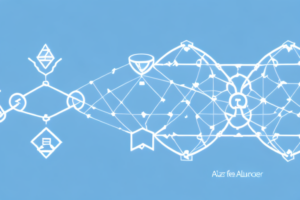Azure SQL Database vs Azure Cosmos DB

Two overlapping clouds
When it comes to choosing a database for your business, there are numerous options available in the market. Azure SQL Database and Azure Cosmos DB are two such popular databases that have become increasingly popular for their robust performance and reliable features. In this article, we will explore the differences between these two databases and help you determine which one is the best fit for your business needs.
Understanding the Fundamentals: What are Azure SQL Database and Azure Cosmos DB?
Azure SQL Database is a relational database that is designed to provide you with a fully managed, scalable, and secure database service. It is an excellent option for organizations that require high-performance, scalable and secure data storage solutions. Azure SQL Database is built on the SQL Server database engine, which ensures that you get all the benefits of a traditional on-premise database, with the added flexibility and scalability of cloud computing.
Azure Cosmos DB, on the other hand, is a globally distributed, multi-model database that is designed for low latency, high throughput, and seamless scalability. It offers extensive support for NoSQL data models, including document, graph, key-value, and column-family data models. Cosmos DB is a highly available database that offers strong consistency guarantees, global distribution, and multi-master replication.
One of the key benefits of Azure Cosmos DB is its ability to provide low latency access to data, regardless of where the data is stored. This is achieved through the use of multiple data models and APIs, which allow developers to access data in the most efficient way possible. Additionally, Cosmos DB offers built-in support for popular APIs such as MongoDB, Cassandra, and Gremlin, making it easy to migrate existing applications to the platform. With its global distribution and multi-master replication, Cosmos DB is an ideal choice for applications that require high availability and low latency access to data.
Comparing Data Models: Relational vs Non-Relational Database
Azure SQL Database is a relational database that uses the traditional SQL data model. It stores data in tables that have predefined fields and relationships between them. It provides standard SQL language support, which allows you to write complex queries and conduct relational operations with SQL commands. Relational databases like Azure SQL Database are best suited for structured, transactional data that has a fixed schema.
Azure Cosmos DB, on the other hand, is a NoSQL database that supports multiple data models. It offers extensive support for non-relational data models, including document, graph, key-value, and column-family data models. Each data model has its own unique set of features and functions that make it ideal for certain use cases. Non-relational databases like Azure Cosmos DB are best suited for unstructured, semi-structured, or varying data types with flexible schemas.
One of the key advantages of using a non-relational database like Azure Cosmos DB is its ability to scale horizontally. This means that as your data grows, you can add more servers to your database cluster to handle the increased load. In contrast, scaling a relational database can be more challenging, as it often involves adding more resources to a single server. Additionally, non-relational databases are often designed to be highly available and fault-tolerant, with built-in replication and failover capabilities. This makes them a good choice for applications that require high levels of uptime and reliability.
Performance Metrics: Which Database is Faster?
When it comes to performance, both Azure SQL Database and Azure Cosmos DB offer robust capabilities. Azure SQL Database offers fast query performance, with the ability to process large volumes of data quickly. It offers near real-time transactional consistency, which makes it ideal for high-concurrency applications. Azure Cosmos DB, on the other hand, offers high throughput, with the ability to handle millions of requests per second. It offers low latency, which makes it ideal for applications that require real-time data processing.
The choice of the database that offers better performance depends on the specific needs of your application. For transactional, structured data, Azure SQL Database may be a better choice. For unstructured, semi-structured, or varying data types that require low latency, Azure Cosmos DB may be a better choice.
Another factor to consider when choosing between Azure SQL Database and Azure Cosmos DB is scalability. Azure Cosmos DB offers automatic scaling, which means that it can handle sudden spikes in traffic without any manual intervention. This makes it ideal for applications that experience unpredictable traffic patterns. Azure SQL Database, on the other hand, requires manual scaling, which can be time-consuming and may result in downtime.
Additionally, Azure Cosmos DB offers multi-model support, which means that it can handle different types of data models, including document, key-value, graph, and column-family. This makes it a versatile choice for applications that require multiple data models. Azure SQL Database, on the other hand, is primarily designed for relational data and may not be the best choice for applications that require multiple data models.
Scalability: Which Database is More Scalable and Adaptable?
Azure SQL Database is designed to be highly scalable and adaptable. It allows you to scale up or down depending on your specific business needs. You can also use elastic pools to manage and optimize resource usage across multiple databases. This means that you can quickly and easily increase or decrease resources based on the specific needs of your application.
Azure Cosmos DB, on the other hand, is designed to be globally distributed and highly scalable. It offers automatic and dynamic scaling, which means that it can automatically adjust resources based on the scale of your application. It also offers multi-master replication, which means that you can write data to any region without experiencing conflicts. This makes it ideal for applications that require low latency, high availability, and global distribution.
It is important to note that while both Azure SQL Database and Azure Cosmos DB are highly scalable, they have different strengths and use cases. Azure SQL Database is best suited for traditional relational database workloads, while Azure Cosmos DB is designed for globally distributed, non-relational workloads. Therefore, it is important to carefully consider your specific business needs and application requirements before choosing which database to use.
Security Features: How Safe are Your Data in Azure SQL Database and Cosmos DB?
Both Azure SQL Database and Azure Cosmos DB offer robust security features that help safeguard your data against cyber threats and attacks. Azure SQL Database offers advanced security features such as transparent data encryption, advanced threat protection, and other security features to help ensure the confidentiality, integrity, and availability of your data.
Azure Cosmos DB, on the other hand, provides built-in global distribution and multi-master replication features, which help safeguard your data against regional outages and attacks. It also offers features such as built-in private endpoints, global firewall rules, and granular permissions to help secure your data.
Cost Comparison: Which One is More Cost-Effective for Your Business?
Cost is an essential factor to consider when choosing a database for your business. Azure SQL Database offers a transparent pricing model that allows you to pay only for what you use. It also provides various deployment options, including serverless, elastic pools, and virtual machines, which allows you to choose the right deployment model that fits your budget.
Azure Cosmos DB, on the other hand, offers a pay-as-you-go pricing model that allows you to pay only for the resources that you use. It also offers an extensive list of features that help you optimize your resource usage, including autoscaling, reserved capacity, and multi-region writes.
Choosing the Right Database for Your Application Needs
Choosing the right database for your business depends on your specific application needs. If you require structured, transactional data with a fixed schema, Azure SQL Database may be the right choice. If you require unstructured, real-time data processing with flexible schemas, Azure Cosmos DB may be the right choice.
The best approach to choosing the right database for your application needs is to assess both your current business needs and future growth plans. This will help you determine which database provides the best fit for your needs, both in terms of performance, scalability, security, and cost.
Integration with Other Services in Azure Ecosystem
Both Azure SQL Database and Azure Cosmos DB integrate seamlessly with other services in the Azure ecosystem. This allows you to optimize your application architecture and build complex applications that rely on multiple Azure services.
Azure SQL Database integrates with various Azure services, such as Azure Functions, Azure API Management, and Azure Analysis Services. It also integrates with other third-party tools, such as Power BI and Tableau, to offer in-depth data analytics capabilities.
Azure Cosmos DB, on the other hand, integrates with various Azure services, such as Azure Functions, Azure Search, and Azure Stream Analytics. It also integrates with many popular NoSQL APIs, such as MongoDB, Cassandra, and Gremlin.
Use Cases and Real-World Examples of Azure SQL Database and Cosmos DB
Both Azure SQL Database and Azure Cosmos DB have numerous use cases and real-world examples that demonstrate their robust capabilities.
Some common use cases of Azure SQL Database include web applications, line-of-business applications, and mobile applications. It is ideal for transactional data with fixed schema and high concurrency.
Azure Cosmos DB, on the other hand, is ideal for applications that require low latency, high throughput, and global distribution. Some common use cases include gaming, IoT, retail, and finance. Its multi-model database capabilities make it a versatile option for various use cases across different industries.
Pros and Cons of Azure SQL Database and Cosmos DB
Like any database, Azure SQL Database and Azure Cosmos DB have their respective pros and cons that make them ideal for certain use cases.
Some of the pros of Azure SQL Database include its support for the traditional SQL data model, robust security features, and flexible deployment options. However, some cons include scalability limitations, being a relational database, and limited support for unstructured or semi-structured data types.
Some of the pros of Azure Cosmos DB include its multi-model database capabilities, global distribution and low latency, and dynamic scalability. Some cons include its pay-as-you-go pricing model, limited support for SQL queries, and the possibility of eventual consistency issues.
Future Outlook and Trends of Both Databases in Cloud Computing Landscape
Both Azure SQL Database and Azure Cosmos DB have a bright future in the cloud computing landscape. As more and more organizations shift their data storage and management needs to the cloud, these two databases will continue to gain popularity.
The growth of IoT, big data, and other emerging technologies will contribute to the increasing demand for these databases. Both Azure SQL Database and Azure Cosmos DB will continue to evolve with new features, functionality, and performance optimizations to meet the growing demands of the market.
Migrating from One Database to Another – Best Practices and Workflow
Migrating data from one database to another can be a complex process that requires careful planning and execution. When migrating from Azure SQL Database to Azure Cosmos DB, or vice versa, it is essential to follow best practices to avoid data loss, downtime, and other issues.
Some best practices for migrating from one database to another include mapping out data schemas, identifying dependencies, defining migration workflows, and conducting thorough testing. It is also essential to ensure that you have adequate resource allocations and to monitor performance during the migration process.
Conclusion
In conclusion, Azure SQL Database and Azure Cosmos DB are both powerful databases that offer robust features and capabilities. They are ideal for specific application needs and use cases that require different types of data models, performance, scalability, security, and cost. By understanding the differences between the two databases, you can make an informed decision about which database is the best fit for your business. Whether you choose Azure SQL Database or Azure Cosmos DB, you can rest assured that you have a reliable and scalable database service that is backed by Microsoft’s world-class cloud computing infrastructure.



